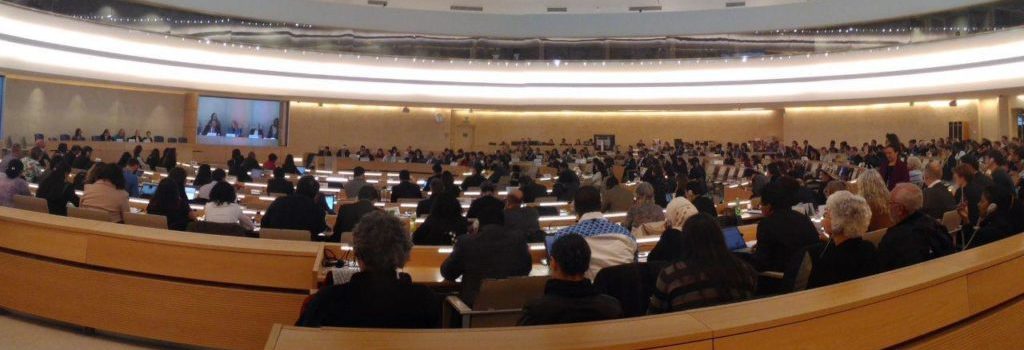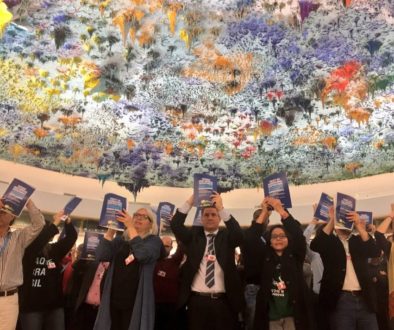The discussion at the UN Human Rights Council
The EU on the edge of abandoning the negotiation
Objections on the procedure.
The EU, together with some States such as Norway or Australia raised objections over the procedure and the proposed draft agenda. In the first place, they complained because the elements for the draft legally binding instrument on transnational corporations and other business enterprises with respect to Human Rights were released with very short notice (29/9/2017).
The second objection concerns the proposed working program. The draft program was only made public on the 18th of October, “not leaving enough time to discuss it and find a compromise”.
A phantom compromise.
According to the EU, a compromise on the working program was reached on Thursday 19 October. The program would be amended in two points, including: a) a point on the implementation and state of play of the Guiding Principles; and b) a footnote in which it is clarifying that “the Program of Work does not limit the discussions of this Intergovernmental Working Group, which can include TNCs as well as all other business enterprises”. [see full statement]
In the proposed agenda, the first point was conceded, but not the second one.
According to the EU, the compromise was accepted by all parties except for South Africa. However, Ecuador disagreed: “there was indeed a proposal from the EU, but a compromise on those terms was never reached”.
The final outcome: the Rapporteur clearly stated that the working program would not be modified and offered the EU to stay under this condition, or leave. The EU decided to stay in the negotiation but stated that: “We will not formally objet although we could have done so and finished in a situation like the one we had two years ago. However, this situation raises issues with this process. If the chairperson can’t hold a past agreement, how can we move forward?”
Some countries reacted stating the following positions:
- The draft program is unacceptable because it limits the scope of the instrument. Even if it mentions “and other business enterprise” in the content of the elements it is clear that it refers mainly to TNC. Some of the counties that supported this position (particularly the EU) argued that not including all business enterprises would be a wrong message to the victims and their families. “They will not understand the distinction, and the reasons why that distinction would grant them a different level of protection depending on who commits the crime. Are we sending the message that victims of abuses by local enterprises will not be protected?”
Other countries supporting this position were: Norway, Australia (who clearly stated that although the reference to “other business enterprises” was foreseen on the title, that was not enough, since it is understood in the context of the resolution 26/9 [i.e. other business enterprises with transnational characteristics] this is problematic for them), Mexico and Russian Federation.
- The draft program shall be adopted as it stands. This position was supported among others by: South Africa, Brazil (who stated that, even if thy will support the expansion of the scope to “all business enterprises” the draft program is correct, since there is a point in which the scope will be discussed), Cuba, Egypt, Argelia, Philippines, Bolivia, Nicaragua (who explicitly signals that there is obviously no consensus on the theatrical “compromise” of the EU) and Venezuela. It is worth it to point out that South Africa remarked that if that footnote was accepted (in the view of the argument of Australia’s delegation) we would be modifying the spirit of a Resolution though a footnote. Azerbaijan (the delegate pointed out that, however, some elements.
The European Parliament position by MEP Lola Sánchez Caldentey
On the opening of the first panel, MEP Lola Sánchez was invited to take the floor and she remarked the following points:
- Announced the launching of a worldwide parliamentary network in support of the Binding Treaty, which has been accompanied by a manifesto –signed by more than 250 representatives worldwide– calling governments to have a proactive role. This network will keep on coordinating the action of Parliamentarians worldwide in support of the Treaty.
- Stressed that the European Parliament has explicitly stated its support to this process in up to 9 Reports and Resolutions.
- Highlighted the support to the Binding Treaty stated in the EU Flagship initiative report on the garment sector of which she was rapportrice. She expanded some of the key elements of the report which concern this ongoing process, namely: the recognition by the European Parliament of the insufficiency of voluntary measures, and the fact that as a resolute, the European Parliament does not only ask for additional voluntary guidelines, but rather for a legislation on binding due diligence obligations which shall be applied throughout the whole value chain.
“The position of the European Parliament is very clear: we need a bonding juridical instrument to stop the impunity with which transnational corporations violate Human Rights in order to ensure access to justice and effective remedy to the victims. I will be very sincere: I have listened the position of the EU delegate with indignation. It is a obstructive and cynical position, and it is totally opposed to the one of the chamber that represents the European people’s will: the European Parliament.
As Parliamentarian, democratically elected by the European citizenship, I ask you to from now on have a constructive and positive position. Otherwise I will be forced to tell you that you are not representing us.”, stated MEP Sánchez Caldentey.
The statement by Lola Sánchez was quoted in Monday and Tuesday’s sessions by several civil society organizations and State delegates, such as Ecuador and Venezuela.
A first general evaluation of the elements for the draft legally binding instrument
- Some of the countries that took the floor in favor of the proposed draft elements were: India (who highlighted the importance of taking into account the needs of developing states), South Africa (who highlighted that the envisaged instrument is not “anti-business”, but aiming to set a level-playing field), Namibia, Azerbaijan (who highlighted the fact that the elements go in the right direction, but some other might have to be added, in particular with regard to TNCs operating on-line), Indonesia, Irak, and the State of Palestine (who highlighted the need to ensure that TNCs refrain from developing economic activities in territories were Human Rights are systematically violated.
- Some of the countries that took the floor against the proposed draft elements were: Switzerland (who highlighted that, in spite of sharing the objective of this group, they believe to focus exclusively in the implementation of the Guiding Principles. In the elements the complementarity of these with the new instrument is unclear; they are mentioned, but they don’t seem to be reflected), and Australia (the efforts to move in this new direction will divert those done to implement the UNGP).


